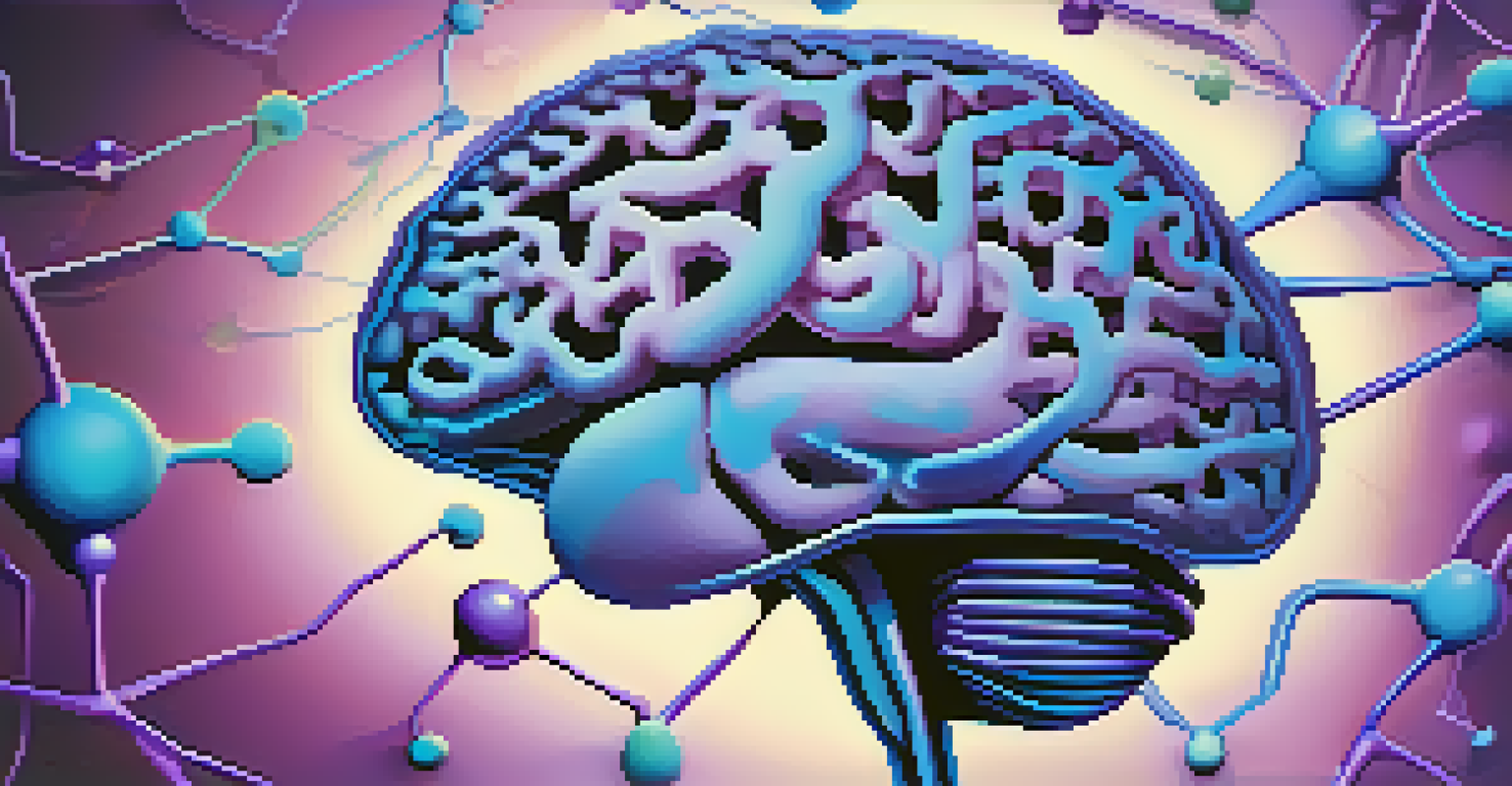The Interaction of Stress and Addiction on Brain Functionality

Defining Stress and Addiction: What You Need to Know
Stress is a natural response to challenging situations, but when prolonged, it can lead to significant health issues. It triggers a cascade of hormonal changes in the body, notably increasing cortisol levels. On the other hand, addiction is a compulsive behavior that often stems from a desire to escape or alleviate stress. Understanding these definitions is key to unraveling their complex interplay.
Stress is not what happens to us. It’s how we respond to what happens that matters.
When we experience stress, our brain's reward system becomes activated, leading many individuals to seek relief through substances or behaviors, which can quickly spiral into addiction. This cycle creates a feedback loop, where stress drives addiction, and addiction, in turn, exacerbates stress. It's a vicious cycle that can be difficult to break without intervention.
Recognizing the intricate relationship between stress and addiction is crucial for developing effective treatment strategies. By addressing both elements simultaneously, we can better support those struggling with these challenges. This understanding lays the groundwork for exploring how they specifically affect brain functionality.
How Stress Alters Brain Functionality
Stress activates the body's fight-or-flight response, which can affect brain functionality significantly. This response floods the brain with cortisol, which, in the short term, can enhance focus and energy. However, chronic stress can lead to structural changes in the brain, particularly in areas like the hippocampus, which is crucial for memory and learning.

Research shows that prolonged exposure to stress can shrink the hippocampus, leading to difficulties in memory retention and emotional regulation. Additionally, the prefrontal cortex, responsible for decision-making and impulse control, can also be negatively impacted. This alteration in brain function can make individuals more susceptible to addictive behaviors as their ability to make rational decisions diminishes.
Stress and Addiction Intertwined
Stress can lead to addiction as individuals seek relief through substances or behaviors, creating a detrimental feedback loop.
Understanding these changes helps us realize why individuals under chronic stress may turn to substances for relief. The brain adapts to the stressors, making it harder to cope healthily. This sets the stage for the next discussion on how addiction further compounds these issues.
The Brain's Reward System and Addiction
The brain's reward system plays a critical role in addiction. It involves regions like the nucleus accumbens and the ventral tegmental area, which release dopamine, the feel-good neurotransmitter. When someone engages in addictive behaviors or consumes substances, this system is hijacked, leading to intense feelings of pleasure and reinforcing the behavior.
Addiction is a symptom of not having a healthy coping mechanism to deal with stress.
In the context of stress, the reward system can become dysregulated. Stress can increase dopamine release, which might tempt individuals to seek out substances for that euphoric feeling. Unfortunately, over time, the brain starts to require more of the substance to achieve the same reward, leading to increased consumption and, ultimately, addiction.
This cycle illustrates how stress can set the stage for addiction by altering the brain's reward pathways. Understanding this interaction is vital for developing effective therapeutic interventions that address both the stress and the addictive behavior simultaneously.
Impact of Stress on Addiction Recovery
Stress significantly impacts the recovery process for individuals battling addiction. High levels of stress can trigger cravings and relapse, making it crucial to manage stress effectively during recovery. Many recovery programs now incorporate stress management techniques, such as mindfulness and cognitive-behavioral therapy, to help individuals cope.
Moreover, social support plays a vital role in mitigating stress during recovery. Building a strong support system can provide emotional stability and reduce feelings of isolation, which often accompany both stress and addiction. Engaging in group therapy or support groups can foster connections that are essential for healing.
Brain Changes from Stress
Chronic stress alters brain functionality, particularly affecting areas responsible for memory and decision-making, which can increase susceptibility to addiction.
Understanding the relationship between stress and recovery can empower individuals to seek out resources and strategies that will aid their journey. By equipping themselves with these tools, they can better navigate the challenges that arise during recovery.
The Role of Neurotransmitters in Stress and Addiction
Neurotransmitters are the chemical messengers in our brains that influence mood and behavior, making them central to understanding the stress-addiction connection. For instance, serotonin, often dubbed the 'happy chemical,' can be affected by both stress and addiction, leading to mood disorders like depression. When stressed, serotonin levels can drop, and individuals may turn to substances to artificially boost their mood.
Additionally, GABA (gamma-aminobutyric acid) is another neurotransmitter that plays a role in regulating anxiety and stress responses. Many addictive substances increase GABA activity, which temporarily alleviates stress but ultimately leads to physical dependence and withdrawal symptoms. This interplay highlights the importance of neurotransmitter balance in managing both stress and addiction.
Recognizing the role of neurotransmitters in this dynamic opens avenues for potential treatments. By targeting these chemical pathways, researchers are developing therapies that could help restore balance and promote healthier coping mechanisms.
Coping Strategies for Managing Stress and Addiction
Effective coping strategies are essential in breaking the cycle of stress and addiction. Techniques such as mindfulness meditation, exercise, and journaling can help individuals manage stress and reduce the urge to engage in addictive behaviors. These practices promote emotional awareness, allowing individuals to recognize triggers and respond more healthily.
Additionally, building resilience through social connections can bolster one's ability to cope with stress. Support from family, friends, or counseling can offer new perspectives and encouragement during tough times. Techniques like cognitive-behavioral therapy can also help reframe negative thought patterns associated with stress and addiction.
Coping Strategies for Recovery
Implementing effective coping strategies, like mindfulness and social support, is essential for managing stress and aiding addiction recovery.
Implementing a combination of these strategies can create a holistic approach to managing stress and addiction. This not only aids in recovery but also fosters a healthier lifestyle that prioritizes mental well-being.
Conclusion: The Path Forward in Addressing Stress and Addiction
In conclusion, the interaction between stress and addiction is complex, influencing brain functionality and individual behavior. Understanding this relationship is crucial for developing effective treatment strategies that address both elements simultaneously. As we continue to research and uncover the nuances of this connection, we can enhance support systems for those affected.
By fostering awareness and educating individuals about the effects of stress on addiction, we empower them to seek help and utilize coping strategies. This knowledge can lead to a more compassionate understanding of addiction as a mental health issue, rather than a moral failing.

Moving forward, it's essential to prioritize holistic approaches that consider the individual's mental, emotional, and social well-being. By doing so, we can pave the way for healthier communities and more effective paths to recovery.